An Investigation into Workplace Motivation at Tesco
VerifiedAdded on 2020/02/03
|12
|4063
|50
Report
AI Summary
This report provides an in-depth analysis of employee motivation issues within Tesco, a multinational retailer. It identifies the core workplace problem as a lack of employee motivation, which negatively impacts morale and productivity. The report delves into the causes of this issue, including pay structure, job security, working conditions, and lack of appreciation. It then explores relevant theories and concepts, particularly Maslow's Hierarchy of Needs, to understand the underlying psychological factors. The report suggests that Tesco should focus on improving employee satisfaction through training, development, rewards, and a supportive work environment. The report also highlights the importance of addressing issues such as low self-confidence and fear of failure to boost employee motivation. The analysis emphasizes the need for a healthy work environment and cordial relations among employees to improve overall productivity and achieve organizational goals. The report concludes with recommendations for Tesco to enhance employee motivation and improve business outcomes.
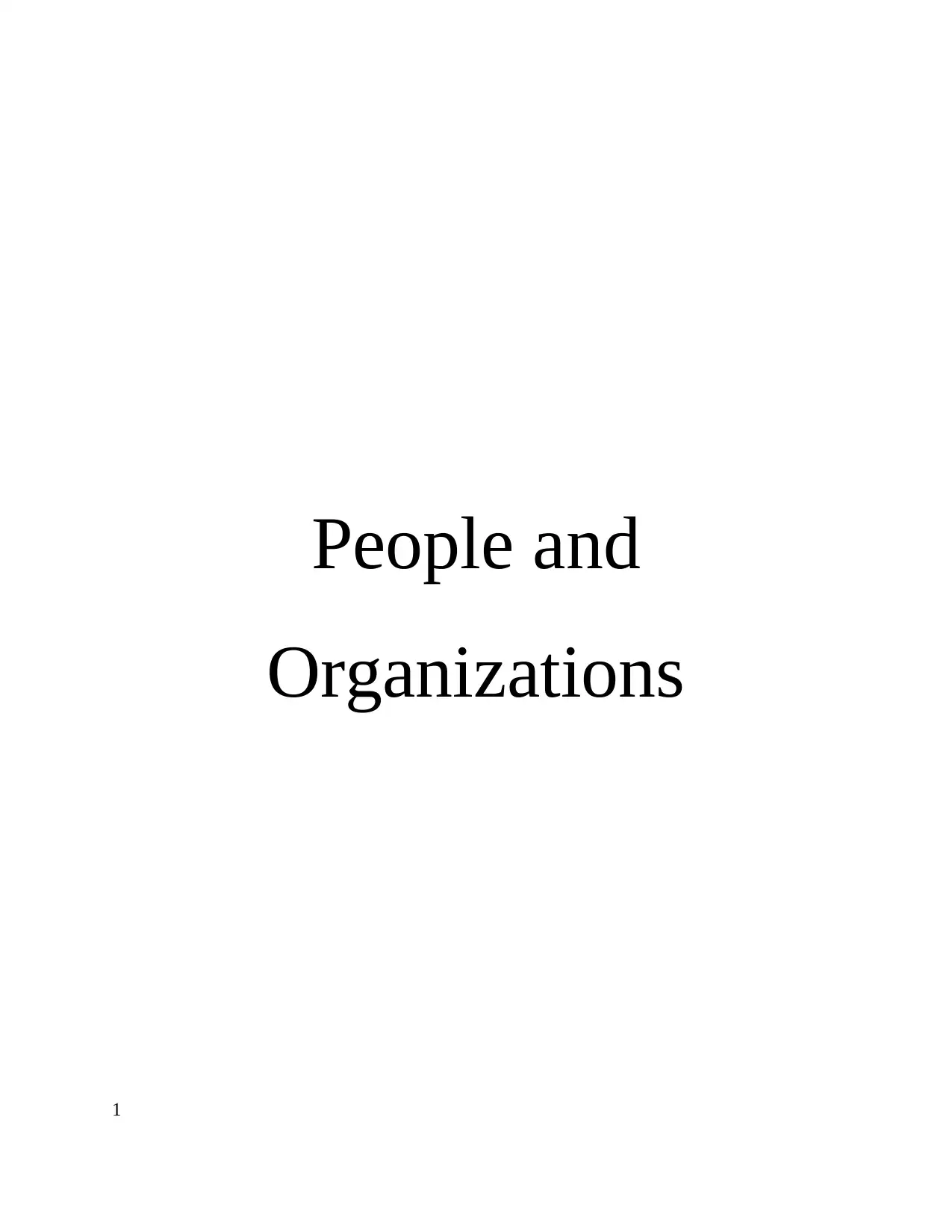
People and
Organizations
1
Organizations
1
Paraphrase This Document
Need a fresh take? Get an instant paraphrase of this document with our AI Paraphraser
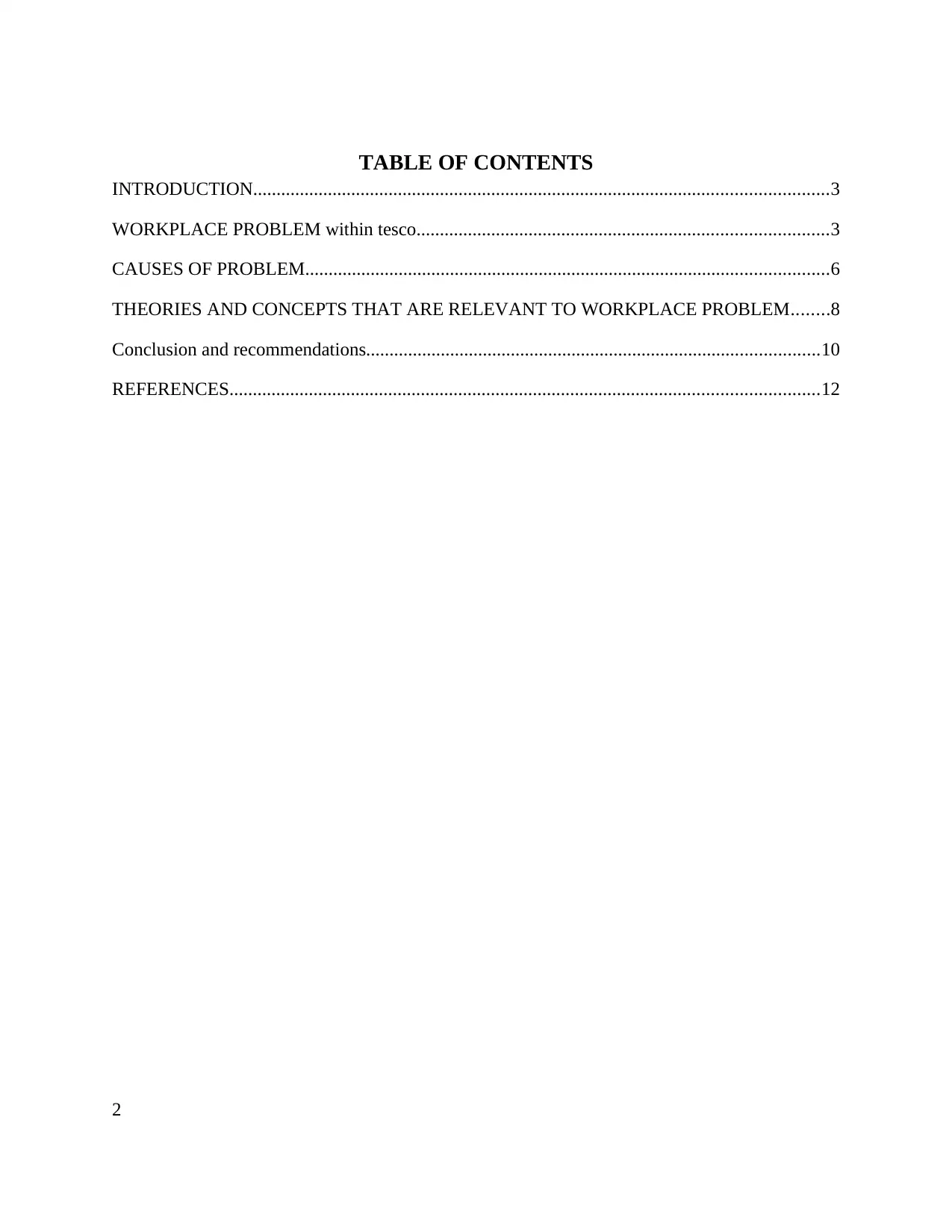
TABLE OF CONTENTS
INTRODUCTION...........................................................................................................................3
WORKPLACE PROBLEM within tesco........................................................................................3
CAUSES OF PROBLEM................................................................................................................6
THEORIES AND CONCEPTS THAT ARE RELEVANT TO WORKPLACE PROBLEM........8
Conclusion and recommendations.................................................................................................10
REFERENCES..............................................................................................................................12
2
INTRODUCTION...........................................................................................................................3
WORKPLACE PROBLEM within tesco........................................................................................3
CAUSES OF PROBLEM................................................................................................................6
THEORIES AND CONCEPTS THAT ARE RELEVANT TO WORKPLACE PROBLEM........8
Conclusion and recommendations.................................................................................................10
REFERENCES..............................................................................................................................12
2
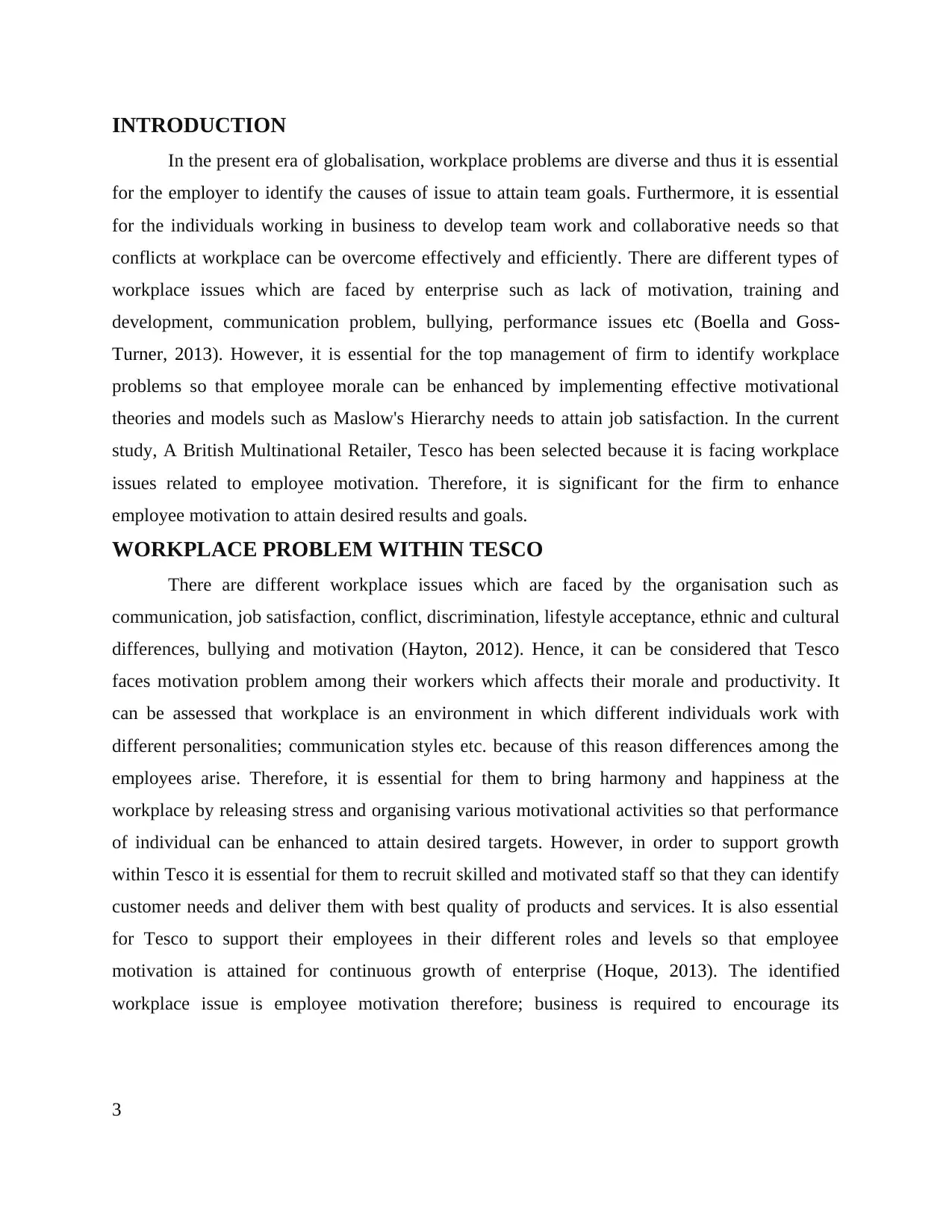
INTRODUCTION
In the present era of globalisation, workplace problems are diverse and thus it is essential
for the employer to identify the causes of issue to attain team goals. Furthermore, it is essential
for the individuals working in business to develop team work and collaborative needs so that
conflicts at workplace can be overcome effectively and efficiently. There are different types of
workplace issues which are faced by enterprise such as lack of motivation, training and
development, communication problem, bullying, performance issues etc (Boella and Goss-
Turner, 2013). However, it is essential for the top management of firm to identify workplace
problems so that employee morale can be enhanced by implementing effective motivational
theories and models such as Maslow's Hierarchy needs to attain job satisfaction. In the current
study, A British Multinational Retailer, Tesco has been selected because it is facing workplace
issues related to employee motivation. Therefore, it is significant for the firm to enhance
employee motivation to attain desired results and goals.
WORKPLACE PROBLEM WITHIN TESCO
There are different workplace issues which are faced by the organisation such as
communication, job satisfaction, conflict, discrimination, lifestyle acceptance, ethnic and cultural
differences, bullying and motivation (Hayton, 2012). Hence, it can be considered that Tesco
faces motivation problem among their workers which affects their morale and productivity. It
can be assessed that workplace is an environment in which different individuals work with
different personalities; communication styles etc. because of this reason differences among the
employees arise. Therefore, it is essential for them to bring harmony and happiness at the
workplace by releasing stress and organising various motivational activities so that performance
of individual can be enhanced to attain desired targets. However, in order to support growth
within Tesco it is essential for them to recruit skilled and motivated staff so that they can identify
customer needs and deliver them with best quality of products and services. It is also essential
for Tesco to support their employees in their different roles and levels so that employee
motivation is attained for continuous growth of enterprise (Hoque, 2013). The identified
workplace issue is employee motivation therefore; business is required to encourage its
3
In the present era of globalisation, workplace problems are diverse and thus it is essential
for the employer to identify the causes of issue to attain team goals. Furthermore, it is essential
for the individuals working in business to develop team work and collaborative needs so that
conflicts at workplace can be overcome effectively and efficiently. There are different types of
workplace issues which are faced by enterprise such as lack of motivation, training and
development, communication problem, bullying, performance issues etc (Boella and Goss-
Turner, 2013). However, it is essential for the top management of firm to identify workplace
problems so that employee morale can be enhanced by implementing effective motivational
theories and models such as Maslow's Hierarchy needs to attain job satisfaction. In the current
study, A British Multinational Retailer, Tesco has been selected because it is facing workplace
issues related to employee motivation. Therefore, it is significant for the firm to enhance
employee motivation to attain desired results and goals.
WORKPLACE PROBLEM WITHIN TESCO
There are different workplace issues which are faced by the organisation such as
communication, job satisfaction, conflict, discrimination, lifestyle acceptance, ethnic and cultural
differences, bullying and motivation (Hayton, 2012). Hence, it can be considered that Tesco
faces motivation problem among their workers which affects their morale and productivity. It
can be assessed that workplace is an environment in which different individuals work with
different personalities; communication styles etc. because of this reason differences among the
employees arise. Therefore, it is essential for them to bring harmony and happiness at the
workplace by releasing stress and organising various motivational activities so that performance
of individual can be enhanced to attain desired targets. However, in order to support growth
within Tesco it is essential for them to recruit skilled and motivated staff so that they can identify
customer needs and deliver them with best quality of products and services. It is also essential
for Tesco to support their employees in their different roles and levels so that employee
motivation is attained for continuous growth of enterprise (Hoque, 2013). The identified
workplace issue is employee motivation therefore; business is required to encourage its
3
⊘ This is a preview!⊘
Do you want full access?
Subscribe today to unlock all pages.

Trusted by 1+ million students worldwide
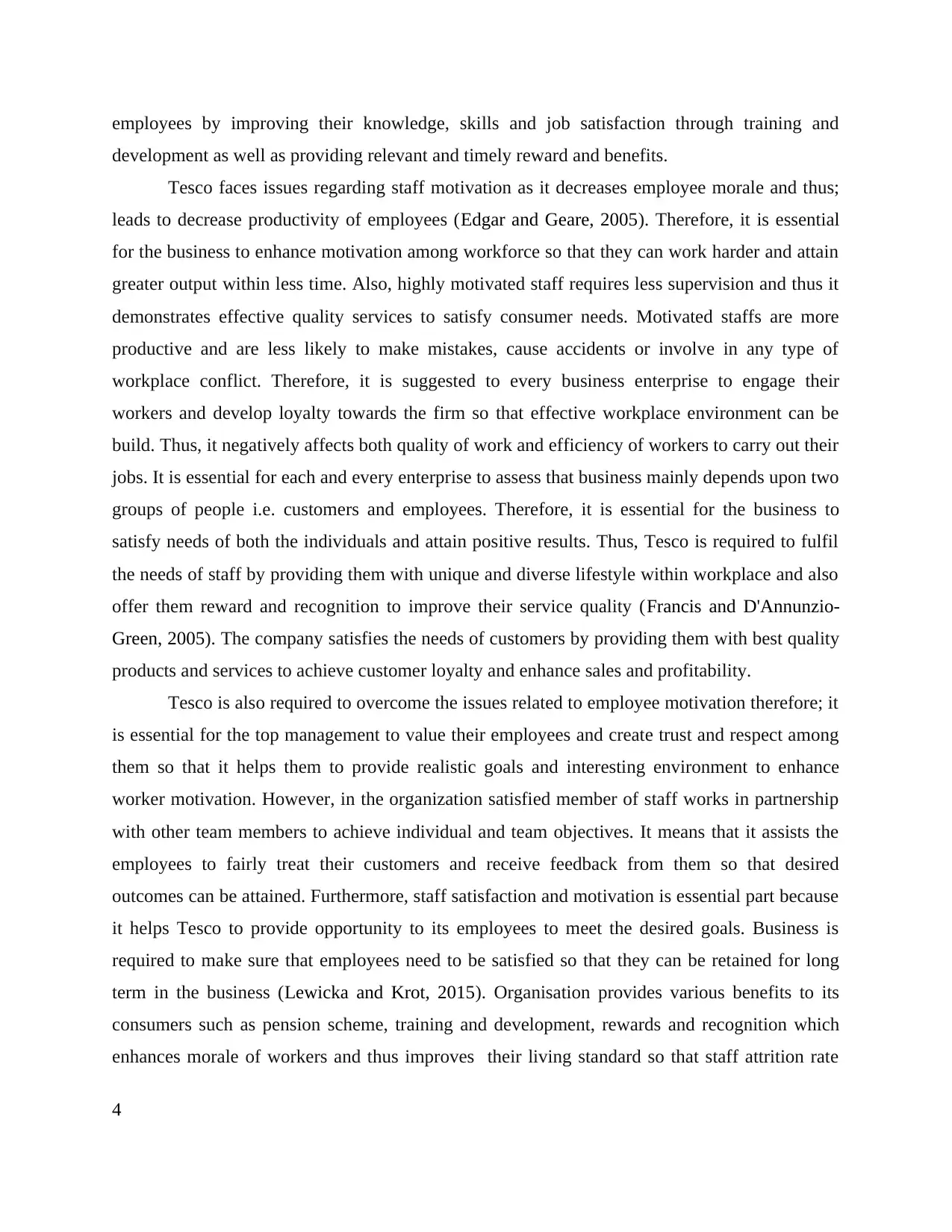
employees by improving their knowledge, skills and job satisfaction through training and
development as well as providing relevant and timely reward and benefits.
Tesco faces issues regarding staff motivation as it decreases employee morale and thus;
leads to decrease productivity of employees (Edgar and Geare, 2005). Therefore, it is essential
for the business to enhance motivation among workforce so that they can work harder and attain
greater output within less time. Also, highly motivated staff requires less supervision and thus it
demonstrates effective quality services to satisfy consumer needs. Motivated staffs are more
productive and are less likely to make mistakes, cause accidents or involve in any type of
workplace conflict. Therefore, it is suggested to every business enterprise to engage their
workers and develop loyalty towards the firm so that effective workplace environment can be
build. Thus, it negatively affects both quality of work and efficiency of workers to carry out their
jobs. It is essential for each and every enterprise to assess that business mainly depends upon two
groups of people i.e. customers and employees. Therefore, it is essential for the business to
satisfy needs of both the individuals and attain positive results. Thus, Tesco is required to fulfil
the needs of staff by providing them with unique and diverse lifestyle within workplace and also
offer them reward and recognition to improve their service quality (Francis and D'Annunzio‐
Green, 2005). The company satisfies the needs of customers by providing them with best quality
products and services to achieve customer loyalty and enhance sales and profitability.
Tesco is also required to overcome the issues related to employee motivation therefore; it
is essential for the top management to value their employees and create trust and respect among
them so that it helps them to provide realistic goals and interesting environment to enhance
worker motivation. However, in the organization satisfied member of staff works in partnership
with other team members to achieve individual and team objectives. It means that it assists the
employees to fairly treat their customers and receive feedback from them so that desired
outcomes can be attained. Furthermore, staff satisfaction and motivation is essential part because
it helps Tesco to provide opportunity to its employees to meet the desired goals. Business is
required to make sure that employees need to be satisfied so that they can be retained for long
term in the business (Lewicka and Krot, 2015). Organisation provides various benefits to its
consumers such as pension scheme, training and development, rewards and recognition which
enhances morale of workers and thus improves their living standard so that staff attrition rate
4
development as well as providing relevant and timely reward and benefits.
Tesco faces issues regarding staff motivation as it decreases employee morale and thus;
leads to decrease productivity of employees (Edgar and Geare, 2005). Therefore, it is essential
for the business to enhance motivation among workforce so that they can work harder and attain
greater output within less time. Also, highly motivated staff requires less supervision and thus it
demonstrates effective quality services to satisfy consumer needs. Motivated staffs are more
productive and are less likely to make mistakes, cause accidents or involve in any type of
workplace conflict. Therefore, it is suggested to every business enterprise to engage their
workers and develop loyalty towards the firm so that effective workplace environment can be
build. Thus, it negatively affects both quality of work and efficiency of workers to carry out their
jobs. It is essential for each and every enterprise to assess that business mainly depends upon two
groups of people i.e. customers and employees. Therefore, it is essential for the business to
satisfy needs of both the individuals and attain positive results. Thus, Tesco is required to fulfil
the needs of staff by providing them with unique and diverse lifestyle within workplace and also
offer them reward and recognition to improve their service quality (Francis and D'Annunzio‐
Green, 2005). The company satisfies the needs of customers by providing them with best quality
products and services to achieve customer loyalty and enhance sales and profitability.
Tesco is also required to overcome the issues related to employee motivation therefore; it
is essential for the top management to value their employees and create trust and respect among
them so that it helps them to provide realistic goals and interesting environment to enhance
worker motivation. However, in the organization satisfied member of staff works in partnership
with other team members to achieve individual and team objectives. It means that it assists the
employees to fairly treat their customers and receive feedback from them so that desired
outcomes can be attained. Furthermore, staff satisfaction and motivation is essential part because
it helps Tesco to provide opportunity to its employees to meet the desired goals. Business is
required to make sure that employees need to be satisfied so that they can be retained for long
term in the business (Lewicka and Krot, 2015). Organisation provides various benefits to its
consumers such as pension scheme, training and development, rewards and recognition which
enhances morale of workers and thus improves their living standard so that staff attrition rate
4
Paraphrase This Document
Need a fresh take? Get an instant paraphrase of this document with our AI Paraphraser
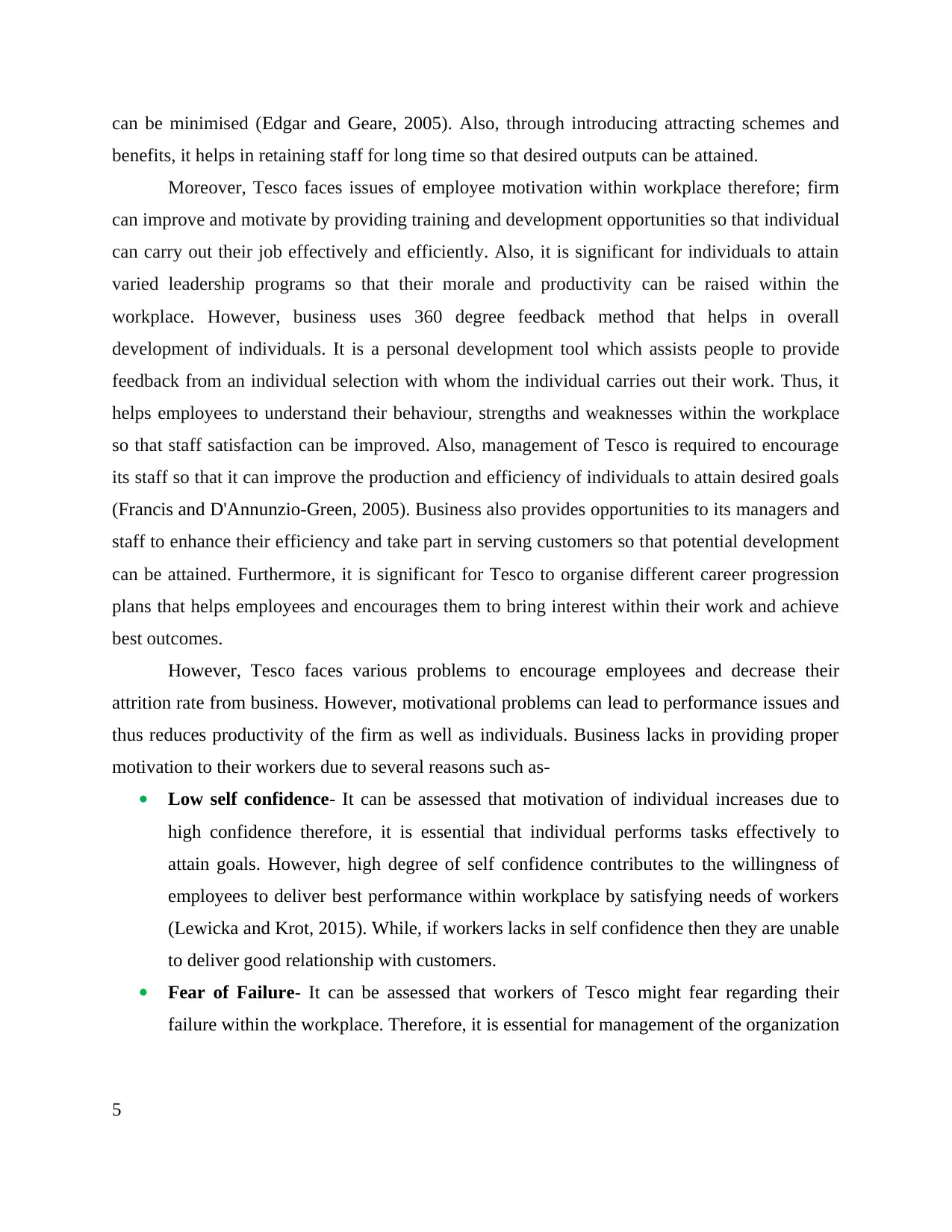
can be minimised (Edgar and Geare, 2005). Also, through introducing attracting schemes and
benefits, it helps in retaining staff for long time so that desired outputs can be attained.
Moreover, Tesco faces issues of employee motivation within workplace therefore; firm
can improve and motivate by providing training and development opportunities so that individual
can carry out their job effectively and efficiently. Also, it is significant for individuals to attain
varied leadership programs so that their morale and productivity can be raised within the
workplace. However, business uses 360 degree feedback method that helps in overall
development of individuals. It is a personal development tool which assists people to provide
feedback from an individual selection with whom the individual carries out their work. Thus, it
helps employees to understand their behaviour, strengths and weaknesses within the workplace
so that staff satisfaction can be improved. Also, management of Tesco is required to encourage
its staff so that it can improve the production and efficiency of individuals to attain desired goals
(Francis and D'Annunzio‐Green, 2005). Business also provides opportunities to its managers and
staff to enhance their efficiency and take part in serving customers so that potential development
can be attained. Furthermore, it is significant for Tesco to organise different career progression
plans that helps employees and encourages them to bring interest within their work and achieve
best outcomes.
However, Tesco faces various problems to encourage employees and decrease their
attrition rate from business. However, motivational problems can lead to performance issues and
thus reduces productivity of the firm as well as individuals. Business lacks in providing proper
motivation to their workers due to several reasons such as-
Low self confidence- It can be assessed that motivation of individual increases due to
high confidence therefore, it is essential that individual performs tasks effectively to
attain goals. However, high degree of self confidence contributes to the willingness of
employees to deliver best performance within workplace by satisfying needs of workers
(Lewicka and Krot, 2015). While, if workers lacks in self confidence then they are unable
to deliver good relationship with customers.
Fear of Failure- It can be assessed that workers of Tesco might fear regarding their
failure within the workplace. Therefore, it is essential for management of the organization
5
benefits, it helps in retaining staff for long time so that desired outputs can be attained.
Moreover, Tesco faces issues of employee motivation within workplace therefore; firm
can improve and motivate by providing training and development opportunities so that individual
can carry out their job effectively and efficiently. Also, it is significant for individuals to attain
varied leadership programs so that their morale and productivity can be raised within the
workplace. However, business uses 360 degree feedback method that helps in overall
development of individuals. It is a personal development tool which assists people to provide
feedback from an individual selection with whom the individual carries out their work. Thus, it
helps employees to understand their behaviour, strengths and weaknesses within the workplace
so that staff satisfaction can be improved. Also, management of Tesco is required to encourage
its staff so that it can improve the production and efficiency of individuals to attain desired goals
(Francis and D'Annunzio‐Green, 2005). Business also provides opportunities to its managers and
staff to enhance their efficiency and take part in serving customers so that potential development
can be attained. Furthermore, it is significant for Tesco to organise different career progression
plans that helps employees and encourages them to bring interest within their work and achieve
best outcomes.
However, Tesco faces various problems to encourage employees and decrease their
attrition rate from business. However, motivational problems can lead to performance issues and
thus reduces productivity of the firm as well as individuals. Business lacks in providing proper
motivation to their workers due to several reasons such as-
Low self confidence- It can be assessed that motivation of individual increases due to
high confidence therefore, it is essential that individual performs tasks effectively to
attain goals. However, high degree of self confidence contributes to the willingness of
employees to deliver best performance within workplace by satisfying needs of workers
(Lewicka and Krot, 2015). While, if workers lacks in self confidence then they are unable
to deliver good relationship with customers.
Fear of Failure- It can be assessed that workers of Tesco might fear regarding their
failure within the workplace. Therefore, it is essential for management of the organization
5
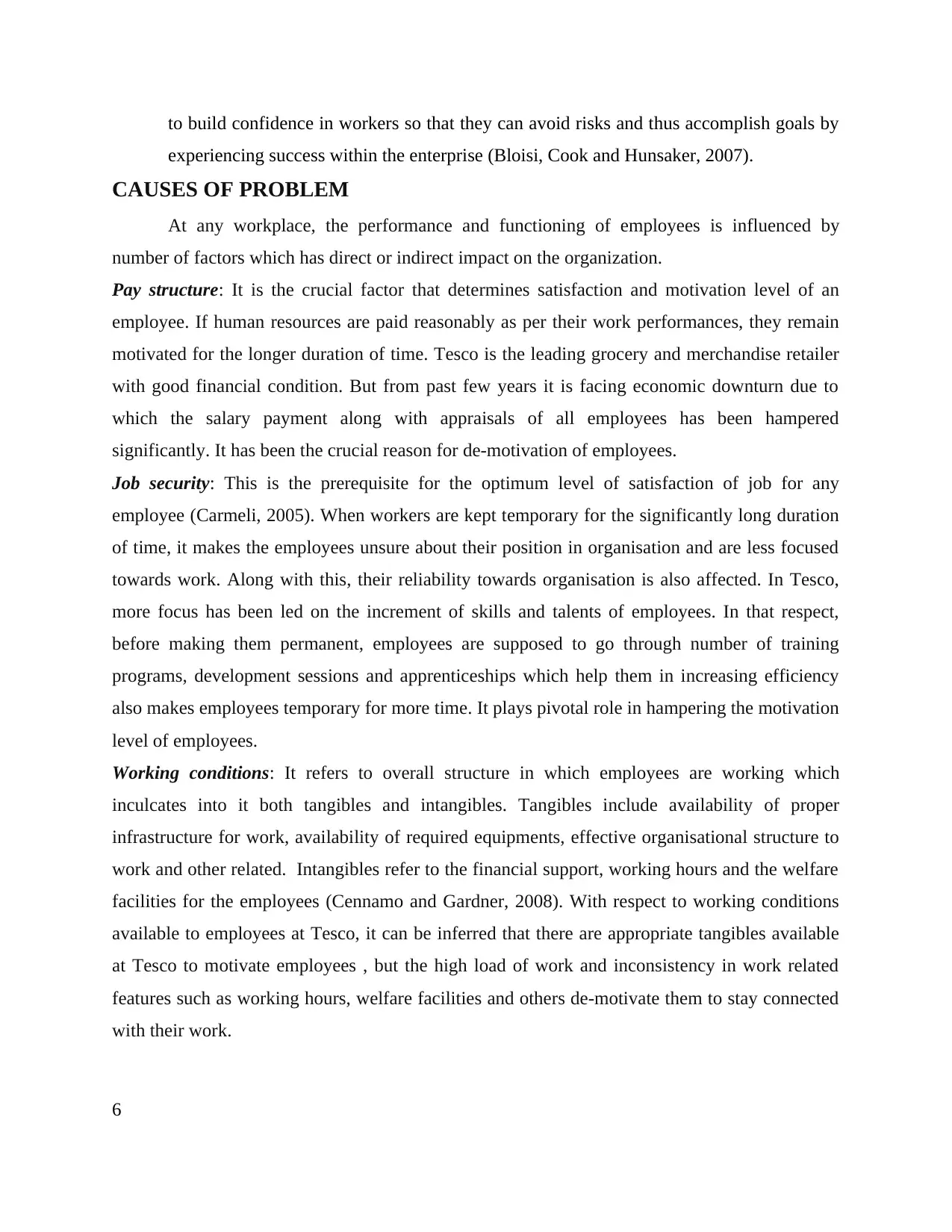
to build confidence in workers so that they can avoid risks and thus accomplish goals by
experiencing success within the enterprise (Bloisi, Cook and Hunsaker, 2007).
CAUSES OF PROBLEM
At any workplace, the performance and functioning of employees is influenced by
number of factors which has direct or indirect impact on the organization.
Pay structure: It is the crucial factor that determines satisfaction and motivation level of an
employee. If human resources are paid reasonably as per their work performances, they remain
motivated for the longer duration of time. Tesco is the leading grocery and merchandise retailer
with good financial condition. But from past few years it is facing economic downturn due to
which the salary payment along with appraisals of all employees has been hampered
significantly. It has been the crucial reason for de-motivation of employees.
Job security: This is the prerequisite for the optimum level of satisfaction of job for any
employee (Carmeli, 2005). When workers are kept temporary for the significantly long duration
of time, it makes the employees unsure about their position in organisation and are less focused
towards work. Along with this, their reliability towards organisation is also affected. In Tesco,
more focus has been led on the increment of skills and talents of employees. In that respect,
before making them permanent, employees are supposed to go through number of training
programs, development sessions and apprenticeships which help them in increasing efficiency
also makes employees temporary for more time. It plays pivotal role in hampering the motivation
level of employees.
Working conditions: It refers to overall structure in which employees are working which
inculcates into it both tangibles and intangibles. Tangibles include availability of proper
infrastructure for work, availability of required equipments, effective organisational structure to
work and other related. Intangibles refer to the financial support, working hours and the welfare
facilities for the employees (Cennamo and Gardner, 2008). With respect to working conditions
available to employees at Tesco, it can be inferred that there are appropriate tangibles available
at Tesco to motivate employees , but the high load of work and inconsistency in work related
features such as working hours, welfare facilities and others de-motivate them to stay connected
with their work.
6
experiencing success within the enterprise (Bloisi, Cook and Hunsaker, 2007).
CAUSES OF PROBLEM
At any workplace, the performance and functioning of employees is influenced by
number of factors which has direct or indirect impact on the organization.
Pay structure: It is the crucial factor that determines satisfaction and motivation level of an
employee. If human resources are paid reasonably as per their work performances, they remain
motivated for the longer duration of time. Tesco is the leading grocery and merchandise retailer
with good financial condition. But from past few years it is facing economic downturn due to
which the salary payment along with appraisals of all employees has been hampered
significantly. It has been the crucial reason for de-motivation of employees.
Job security: This is the prerequisite for the optimum level of satisfaction of job for any
employee (Carmeli, 2005). When workers are kept temporary for the significantly long duration
of time, it makes the employees unsure about their position in organisation and are less focused
towards work. Along with this, their reliability towards organisation is also affected. In Tesco,
more focus has been led on the increment of skills and talents of employees. In that respect,
before making them permanent, employees are supposed to go through number of training
programs, development sessions and apprenticeships which help them in increasing efficiency
also makes employees temporary for more time. It plays pivotal role in hampering the motivation
level of employees.
Working conditions: It refers to overall structure in which employees are working which
inculcates into it both tangibles and intangibles. Tangibles include availability of proper
infrastructure for work, availability of required equipments, effective organisational structure to
work and other related. Intangibles refer to the financial support, working hours and the welfare
facilities for the employees (Cennamo and Gardner, 2008). With respect to working conditions
available to employees at Tesco, it can be inferred that there are appropriate tangibles available
at Tesco to motivate employees , but the high load of work and inconsistency in work related
features such as working hours, welfare facilities and others de-motivate them to stay connected
with their work.
6
⊘ This is a preview!⊘
Do you want full access?
Subscribe today to unlock all pages.

Trusted by 1+ million students worldwide
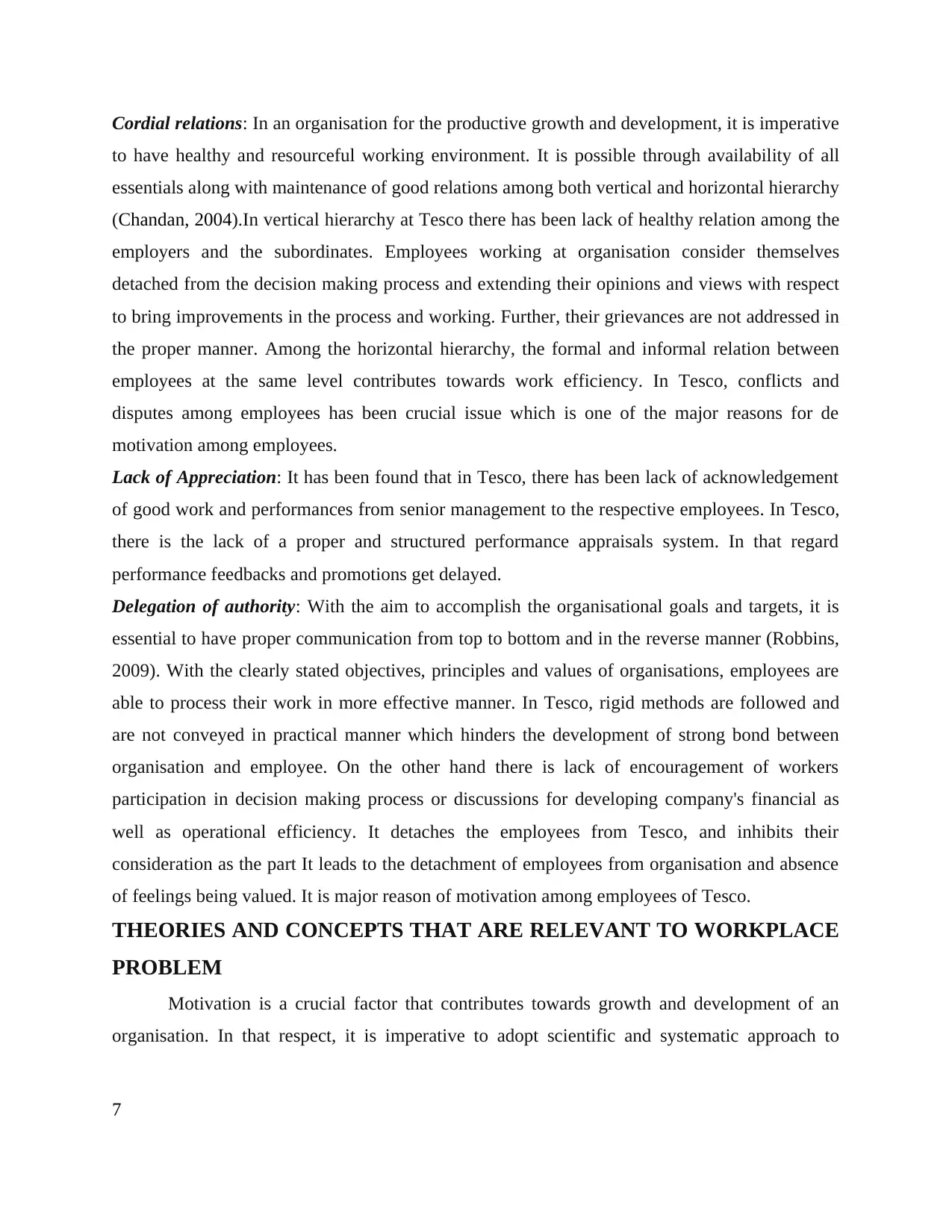
Cordial relations: In an organisation for the productive growth and development, it is imperative
to have healthy and resourceful working environment. It is possible through availability of all
essentials along with maintenance of good relations among both vertical and horizontal hierarchy
(Chandan, 2004).In vertical hierarchy at Tesco there has been lack of healthy relation among the
employers and the subordinates. Employees working at organisation consider themselves
detached from the decision making process and extending their opinions and views with respect
to bring improvements in the process and working. Further, their grievances are not addressed in
the proper manner. Among the horizontal hierarchy, the formal and informal relation between
employees at the same level contributes towards work efficiency. In Tesco, conflicts and
disputes among employees has been crucial issue which is one of the major reasons for de
motivation among employees.
Lack of Appreciation: It has been found that in Tesco, there has been lack of acknowledgement
of good work and performances from senior management to the respective employees. In Tesco,
there is the lack of a proper and structured performance appraisals system. In that regard
performance feedbacks and promotions get delayed.
Delegation of authority: With the aim to accomplish the organisational goals and targets, it is
essential to have proper communication from top to bottom and in the reverse manner (Robbins,
2009). With the clearly stated objectives, principles and values of organisations, employees are
able to process their work in more effective manner. In Tesco, rigid methods are followed and
are not conveyed in practical manner which hinders the development of strong bond between
organisation and employee. On the other hand there is lack of encouragement of workers
participation in decision making process or discussions for developing company's financial as
well as operational efficiency. It detaches the employees from Tesco, and inhibits their
consideration as the part It leads to the detachment of employees from organisation and absence
of feelings being valued. It is major reason of motivation among employees of Tesco.
THEORIES AND CONCEPTS THAT ARE RELEVANT TO WORKPLACE
PROBLEM
Motivation is a crucial factor that contributes towards growth and development of an
organisation. In that respect, it is imperative to adopt scientific and systematic approach to
7
to have healthy and resourceful working environment. It is possible through availability of all
essentials along with maintenance of good relations among both vertical and horizontal hierarchy
(Chandan, 2004).In vertical hierarchy at Tesco there has been lack of healthy relation among the
employers and the subordinates. Employees working at organisation consider themselves
detached from the decision making process and extending their opinions and views with respect
to bring improvements in the process and working. Further, their grievances are not addressed in
the proper manner. Among the horizontal hierarchy, the formal and informal relation between
employees at the same level contributes towards work efficiency. In Tesco, conflicts and
disputes among employees has been crucial issue which is one of the major reasons for de
motivation among employees.
Lack of Appreciation: It has been found that in Tesco, there has been lack of acknowledgement
of good work and performances from senior management to the respective employees. In Tesco,
there is the lack of a proper and structured performance appraisals system. In that regard
performance feedbacks and promotions get delayed.
Delegation of authority: With the aim to accomplish the organisational goals and targets, it is
essential to have proper communication from top to bottom and in the reverse manner (Robbins,
2009). With the clearly stated objectives, principles and values of organisations, employees are
able to process their work in more effective manner. In Tesco, rigid methods are followed and
are not conveyed in practical manner which hinders the development of strong bond between
organisation and employee. On the other hand there is lack of encouragement of workers
participation in decision making process or discussions for developing company's financial as
well as operational efficiency. It detaches the employees from Tesco, and inhibits their
consideration as the part It leads to the detachment of employees from organisation and absence
of feelings being valued. It is major reason of motivation among employees of Tesco.
THEORIES AND CONCEPTS THAT ARE RELEVANT TO WORKPLACE
PROBLEM
Motivation is a crucial factor that contributes towards growth and development of an
organisation. In that respect, it is imperative to adopt scientific and systematic approach to
7
Paraphrase This Document
Need a fresh take? Get an instant paraphrase of this document with our AI Paraphraser
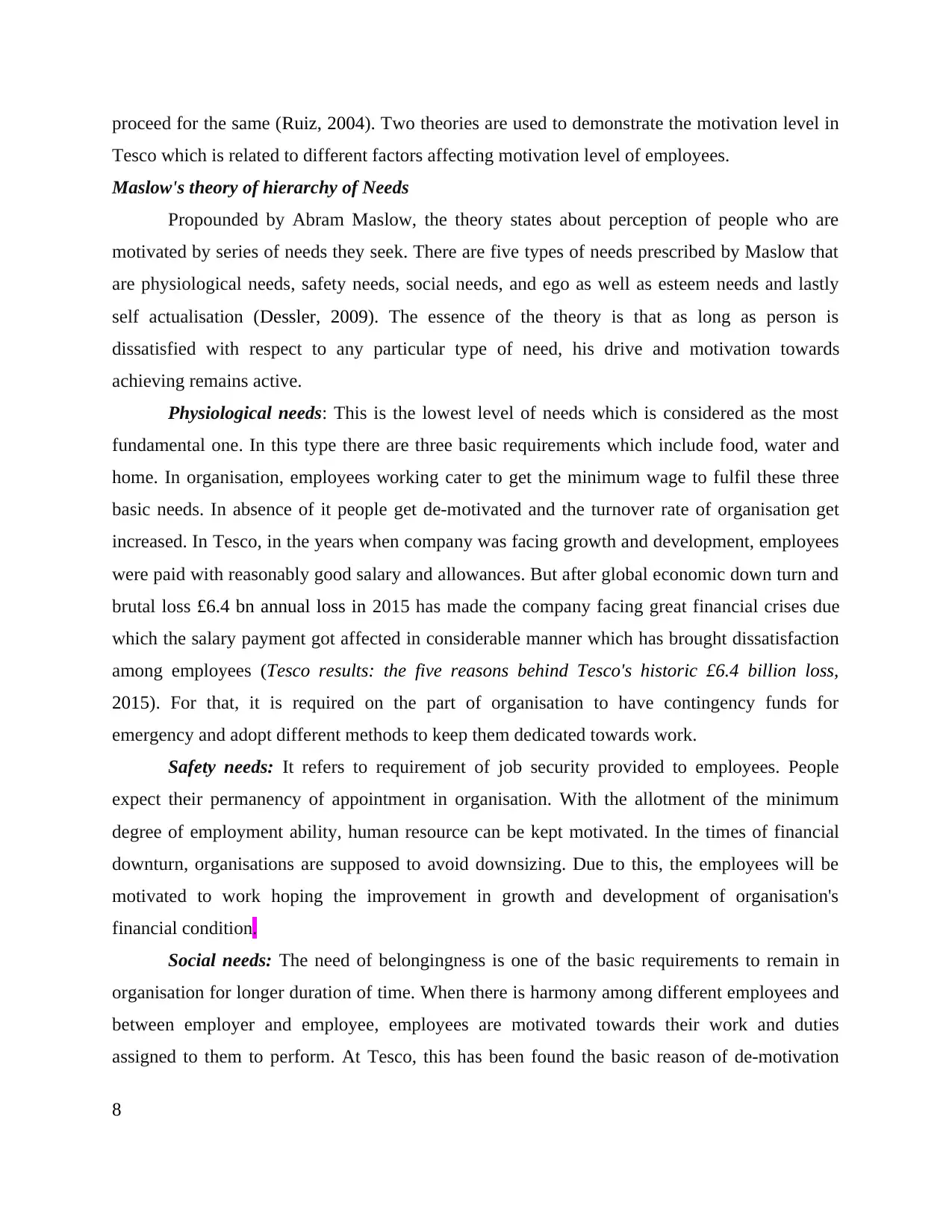
proceed for the same (Ruiz, 2004). Two theories are used to demonstrate the motivation level in
Tesco which is related to different factors affecting motivation level of employees.
Maslow's theory of hierarchy of Needs
Propounded by Abram Maslow, the theory states about perception of people who are
motivated by series of needs they seek. There are five types of needs prescribed by Maslow that
are physiological needs, safety needs, social needs, and ego as well as esteem needs and lastly
self actualisation (Dessler, 2009). The essence of the theory is that as long as person is
dissatisfied with respect to any particular type of need, his drive and motivation towards
achieving remains active.
Physiological needs: This is the lowest level of needs which is considered as the most
fundamental one. In this type there are three basic requirements which include food, water and
home. In organisation, employees working cater to get the minimum wage to fulfil these three
basic needs. In absence of it people get de-motivated and the turnover rate of organisation get
increased. In Tesco, in the years when company was facing growth and development, employees
were paid with reasonably good salary and allowances. But after global economic down turn and
brutal loss £6.4 bn annual loss in 2015 has made the company facing great financial crises due
which the salary payment got affected in considerable manner which has brought dissatisfaction
among employees (Tesco results: the five reasons behind Tesco's historic £6.4 billion loss,
2015). For that, it is required on the part of organisation to have contingency funds for
emergency and adopt different methods to keep them dedicated towards work.
Safety needs: It refers to requirement of job security provided to employees. People
expect their permanency of appointment in organisation. With the allotment of the minimum
degree of employment ability, human resource can be kept motivated. In the times of financial
downturn, organisations are supposed to avoid downsizing. Due to this, the employees will be
motivated to work hoping the improvement in growth and development of organisation's
financial condition.
Social needs: The need of belongingness is one of the basic requirements to remain in
organisation for longer duration of time. When there is harmony among different employees and
between employer and employee, employees are motivated towards their work and duties
assigned to them to perform. At Tesco, this has been found the basic reason of de-motivation
8
Tesco which is related to different factors affecting motivation level of employees.
Maslow's theory of hierarchy of Needs
Propounded by Abram Maslow, the theory states about perception of people who are
motivated by series of needs they seek. There are five types of needs prescribed by Maslow that
are physiological needs, safety needs, social needs, and ego as well as esteem needs and lastly
self actualisation (Dessler, 2009). The essence of the theory is that as long as person is
dissatisfied with respect to any particular type of need, his drive and motivation towards
achieving remains active.
Physiological needs: This is the lowest level of needs which is considered as the most
fundamental one. In this type there are three basic requirements which include food, water and
home. In organisation, employees working cater to get the minimum wage to fulfil these three
basic needs. In absence of it people get de-motivated and the turnover rate of organisation get
increased. In Tesco, in the years when company was facing growth and development, employees
were paid with reasonably good salary and allowances. But after global economic down turn and
brutal loss £6.4 bn annual loss in 2015 has made the company facing great financial crises due
which the salary payment got affected in considerable manner which has brought dissatisfaction
among employees (Tesco results: the five reasons behind Tesco's historic £6.4 billion loss,
2015). For that, it is required on the part of organisation to have contingency funds for
emergency and adopt different methods to keep them dedicated towards work.
Safety needs: It refers to requirement of job security provided to employees. People
expect their permanency of appointment in organisation. With the allotment of the minimum
degree of employment ability, human resource can be kept motivated. In the times of financial
downturn, organisations are supposed to avoid downsizing. Due to this, the employees will be
motivated to work hoping the improvement in growth and development of organisation's
financial condition.
Social needs: The need of belongingness is one of the basic requirements to remain in
organisation for longer duration of time. When there is harmony among different employees and
between employer and employee, employees are motivated towards their work and duties
assigned to them to perform. At Tesco, this has been found the basic reason of de-motivation
8
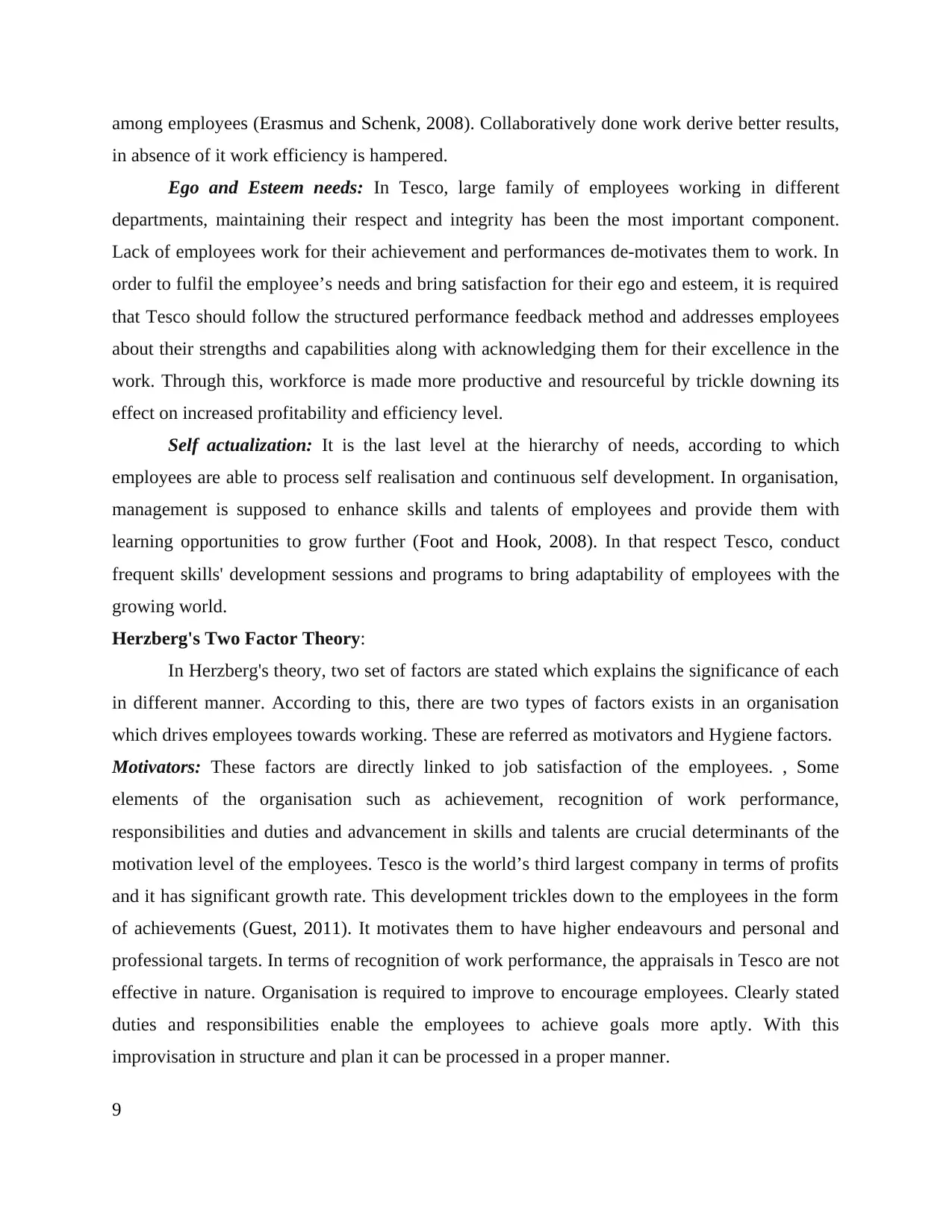
among employees (Erasmus and Schenk, 2008). Collaboratively done work derive better results,
in absence of it work efficiency is hampered.
Ego and Esteem needs: In Tesco, large family of employees working in different
departments, maintaining their respect and integrity has been the most important component.
Lack of employees work for their achievement and performances de-motivates them to work. In
order to fulfil the employee’s needs and bring satisfaction for their ego and esteem, it is required
that Tesco should follow the structured performance feedback method and addresses employees
about their strengths and capabilities along with acknowledging them for their excellence in the
work. Through this, workforce is made more productive and resourceful by trickle downing its
effect on increased profitability and efficiency level.
Self actualization: It is the last level at the hierarchy of needs, according to which
employees are able to process self realisation and continuous self development. In organisation,
management is supposed to enhance skills and talents of employees and provide them with
learning opportunities to grow further (Foot and Hook, 2008). In that respect Tesco, conduct
frequent skills' development sessions and programs to bring adaptability of employees with the
growing world.
Herzberg's Two Factor Theory:
In Herzberg's theory, two set of factors are stated which explains the significance of each
in different manner. According to this, there are two types of factors exists in an organisation
which drives employees towards working. These are referred as motivators and Hygiene factors.
Motivators: These factors are directly linked to job satisfaction of the employees. , Some
elements of the organisation such as achievement, recognition of work performance,
responsibilities and duties and advancement in skills and talents are crucial determinants of the
motivation level of the employees. Tesco is the world’s third largest company in terms of profits
and it has significant growth rate. This development trickles down to the employees in the form
of achievements (Guest, 2011). It motivates them to have higher endeavours and personal and
professional targets. In terms of recognition of work performance, the appraisals in Tesco are not
effective in nature. Organisation is required to improve to encourage employees. Clearly stated
duties and responsibilities enable the employees to achieve goals more aptly. With this
improvisation in structure and plan it can be processed in a proper manner.
9
in absence of it work efficiency is hampered.
Ego and Esteem needs: In Tesco, large family of employees working in different
departments, maintaining their respect and integrity has been the most important component.
Lack of employees work for their achievement and performances de-motivates them to work. In
order to fulfil the employee’s needs and bring satisfaction for their ego and esteem, it is required
that Tesco should follow the structured performance feedback method and addresses employees
about their strengths and capabilities along with acknowledging them for their excellence in the
work. Through this, workforce is made more productive and resourceful by trickle downing its
effect on increased profitability and efficiency level.
Self actualization: It is the last level at the hierarchy of needs, according to which
employees are able to process self realisation and continuous self development. In organisation,
management is supposed to enhance skills and talents of employees and provide them with
learning opportunities to grow further (Foot and Hook, 2008). In that respect Tesco, conduct
frequent skills' development sessions and programs to bring adaptability of employees with the
growing world.
Herzberg's Two Factor Theory:
In Herzberg's theory, two set of factors are stated which explains the significance of each
in different manner. According to this, there are two types of factors exists in an organisation
which drives employees towards working. These are referred as motivators and Hygiene factors.
Motivators: These factors are directly linked to job satisfaction of the employees. , Some
elements of the organisation such as achievement, recognition of work performance,
responsibilities and duties and advancement in skills and talents are crucial determinants of the
motivation level of the employees. Tesco is the world’s third largest company in terms of profits
and it has significant growth rate. This development trickles down to the employees in the form
of achievements (Guest, 2011). It motivates them to have higher endeavours and personal and
professional targets. In terms of recognition of work performance, the appraisals in Tesco are not
effective in nature. Organisation is required to improve to encourage employees. Clearly stated
duties and responsibilities enable the employees to achieve goals more aptly. With this
improvisation in structure and plan it can be processed in a proper manner.
9
⊘ This is a preview!⊘
Do you want full access?
Subscribe today to unlock all pages.

Trusted by 1+ million students worldwide
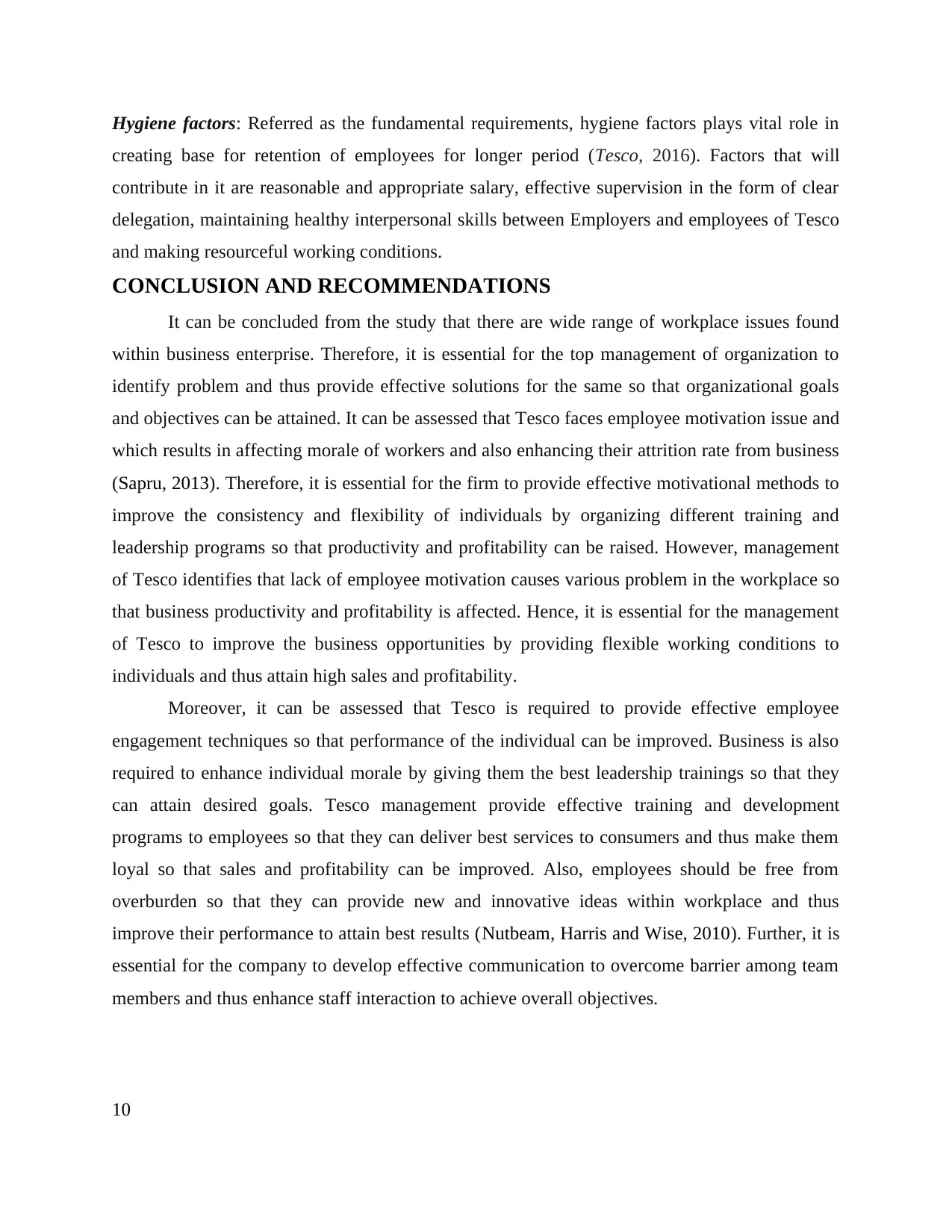
Hygiene factors: Referred as the fundamental requirements, hygiene factors plays vital role in
creating base for retention of employees for longer period (Tesco, 2016). Factors that will
contribute in it are reasonable and appropriate salary, effective supervision in the form of clear
delegation, maintaining healthy interpersonal skills between Employers and employees of Tesco
and making resourceful working conditions.
CONCLUSION AND RECOMMENDATIONS
It can be concluded from the study that there are wide range of workplace issues found
within business enterprise. Therefore, it is essential for the top management of organization to
identify problem and thus provide effective solutions for the same so that organizational goals
and objectives can be attained. It can be assessed that Tesco faces employee motivation issue and
which results in affecting morale of workers and also enhancing their attrition rate from business
(Sapru, 2013). Therefore, it is essential for the firm to provide effective motivational methods to
improve the consistency and flexibility of individuals by organizing different training and
leadership programs so that productivity and profitability can be raised. However, management
of Tesco identifies that lack of employee motivation causes various problem in the workplace so
that business productivity and profitability is affected. Hence, it is essential for the management
of Tesco to improve the business opportunities by providing flexible working conditions to
individuals and thus attain high sales and profitability.
Moreover, it can be assessed that Tesco is required to provide effective employee
engagement techniques so that performance of the individual can be improved. Business is also
required to enhance individual morale by giving them the best leadership trainings so that they
can attain desired goals. Tesco management provide effective training and development
programs to employees so that they can deliver best services to consumers and thus make them
loyal so that sales and profitability can be improved. Also, employees should be free from
overburden so that they can provide new and innovative ideas within workplace and thus
improve their performance to attain best results (Nutbeam, Harris and Wise, 2010). Further, it is
essential for the company to develop effective communication to overcome barrier among team
members and thus enhance staff interaction to achieve overall objectives.
10
creating base for retention of employees for longer period (Tesco, 2016). Factors that will
contribute in it are reasonable and appropriate salary, effective supervision in the form of clear
delegation, maintaining healthy interpersonal skills between Employers and employees of Tesco
and making resourceful working conditions.
CONCLUSION AND RECOMMENDATIONS
It can be concluded from the study that there are wide range of workplace issues found
within business enterprise. Therefore, it is essential for the top management of organization to
identify problem and thus provide effective solutions for the same so that organizational goals
and objectives can be attained. It can be assessed that Tesco faces employee motivation issue and
which results in affecting morale of workers and also enhancing their attrition rate from business
(Sapru, 2013). Therefore, it is essential for the firm to provide effective motivational methods to
improve the consistency and flexibility of individuals by organizing different training and
leadership programs so that productivity and profitability can be raised. However, management
of Tesco identifies that lack of employee motivation causes various problem in the workplace so
that business productivity and profitability is affected. Hence, it is essential for the management
of Tesco to improve the business opportunities by providing flexible working conditions to
individuals and thus attain high sales and profitability.
Moreover, it can be assessed that Tesco is required to provide effective employee
engagement techniques so that performance of the individual can be improved. Business is also
required to enhance individual morale by giving them the best leadership trainings so that they
can attain desired goals. Tesco management provide effective training and development
programs to employees so that they can deliver best services to consumers and thus make them
loyal so that sales and profitability can be improved. Also, employees should be free from
overburden so that they can provide new and innovative ideas within workplace and thus
improve their performance to attain best results (Nutbeam, Harris and Wise, 2010). Further, it is
essential for the company to develop effective communication to overcome barrier among team
members and thus enhance staff interaction to achieve overall objectives.
10
Paraphrase This Document
Need a fresh take? Get an instant paraphrase of this document with our AI Paraphraser
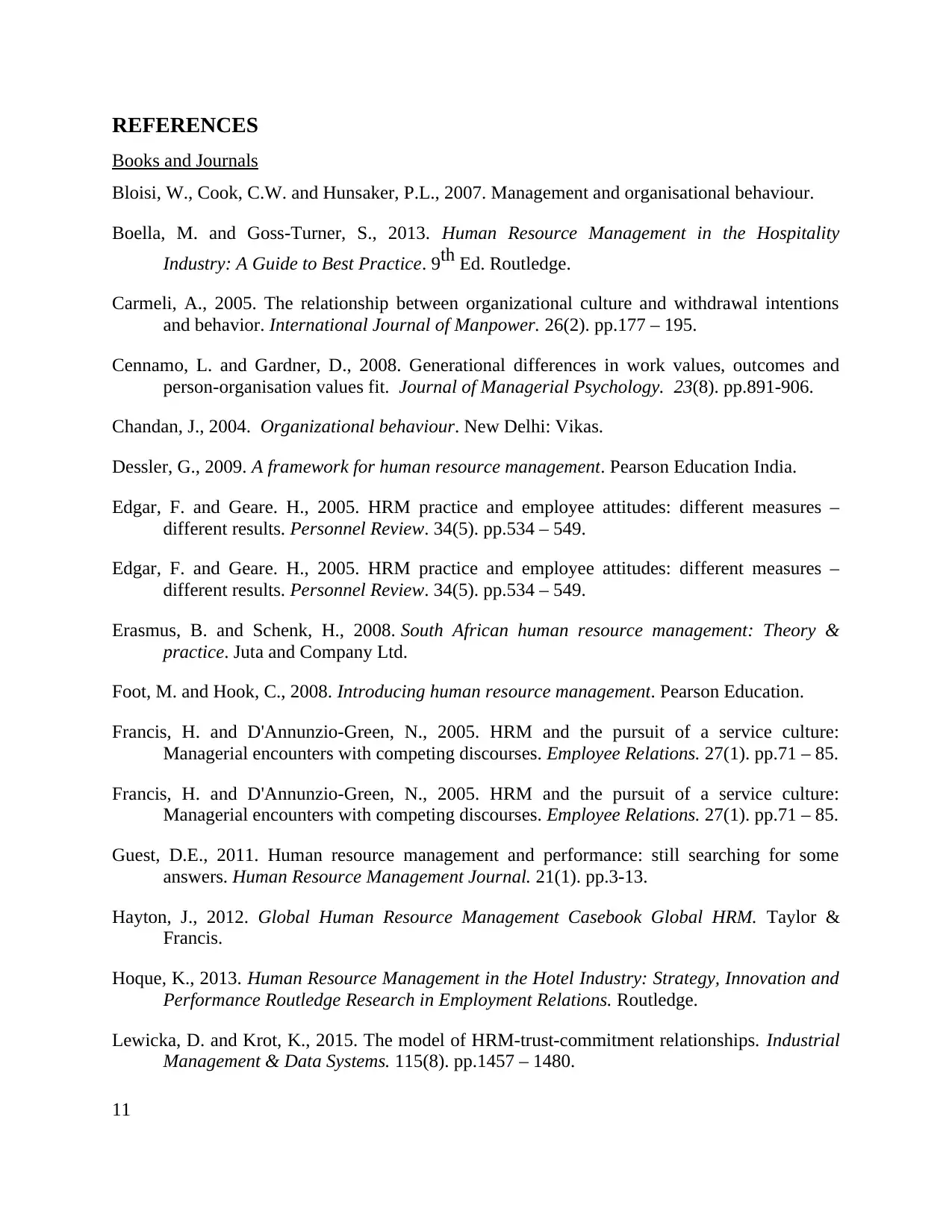
REFERENCES
Books and Journals
Bloisi, W., Cook, C.W. and Hunsaker, P.L., 2007. Management and organisational behaviour.
Boella, M. and Goss-Turner, S., 2013. Human Resource Management in the Hospitality
Industry: A Guide to Best Practice. 9th Ed. Routledge.
Carmeli, A., 2005. The relationship between organizational culture and withdrawal intentions
and behavior. International Journal of Manpower. 26(2). pp.177 – 195.
Cennamo, L. and Gardner, D., 2008. Generational differences in work values, outcomes and
person-organisation values fit. Journal of Managerial Psychology. 23(8). pp.891-906.
Chandan, J., 2004. Organizational behaviour. New Delhi: Vikas.
Dessler, G., 2009. A framework for human resource management. Pearson Education India.
Edgar, F. and Geare. H., 2005. HRM practice and employee attitudes: different measures –
different results. Personnel Review. 34(5). pp.534 – 549.
Edgar, F. and Geare. H., 2005. HRM practice and employee attitudes: different measures –
different results. Personnel Review. 34(5). pp.534 – 549.
Erasmus, B. and Schenk, H., 2008. South African human resource management: Theory &
practice. Juta and Company Ltd.
Foot, M. and Hook, C., 2008. Introducing human resource management. Pearson Education.
Francis, H. and D'Annunzio‐Green, N., 2005. HRM and the pursuit of a service culture:
Managerial encounters with competing discourses. Employee Relations. 27(1). pp.71 – 85.
Francis, H. and D'Annunzio‐Green, N., 2005. HRM and the pursuit of a service culture:
Managerial encounters with competing discourses. Employee Relations. 27(1). pp.71 – 85.
Guest, D.E., 2011. Human resource management and performance: still searching for some
answers. Human Resource Management Journal. 21(1). pp.3-13.
Hayton, J., 2012. Global Human Resource Management Casebook Global HRM. Taylor &
Francis.
Hoque, K., 2013. Human Resource Management in the Hotel Industry: Strategy, Innovation and
Performance Routledge Research in Employment Relations. Routledge.
Lewicka, D. and Krot, K., 2015. The model of HRM-trust-commitment relationships. Industrial
Management & Data Systems. 115(8). pp.1457 – 1480.
11
Books and Journals
Bloisi, W., Cook, C.W. and Hunsaker, P.L., 2007. Management and organisational behaviour.
Boella, M. and Goss-Turner, S., 2013. Human Resource Management in the Hospitality
Industry: A Guide to Best Practice. 9th Ed. Routledge.
Carmeli, A., 2005. The relationship between organizational culture and withdrawal intentions
and behavior. International Journal of Manpower. 26(2). pp.177 – 195.
Cennamo, L. and Gardner, D., 2008. Generational differences in work values, outcomes and
person-organisation values fit. Journal of Managerial Psychology. 23(8). pp.891-906.
Chandan, J., 2004. Organizational behaviour. New Delhi: Vikas.
Dessler, G., 2009. A framework for human resource management. Pearson Education India.
Edgar, F. and Geare. H., 2005. HRM practice and employee attitudes: different measures –
different results. Personnel Review. 34(5). pp.534 – 549.
Edgar, F. and Geare. H., 2005. HRM practice and employee attitudes: different measures –
different results. Personnel Review. 34(5). pp.534 – 549.
Erasmus, B. and Schenk, H., 2008. South African human resource management: Theory &
practice. Juta and Company Ltd.
Foot, M. and Hook, C., 2008. Introducing human resource management. Pearson Education.
Francis, H. and D'Annunzio‐Green, N., 2005. HRM and the pursuit of a service culture:
Managerial encounters with competing discourses. Employee Relations. 27(1). pp.71 – 85.
Francis, H. and D'Annunzio‐Green, N., 2005. HRM and the pursuit of a service culture:
Managerial encounters with competing discourses. Employee Relations. 27(1). pp.71 – 85.
Guest, D.E., 2011. Human resource management and performance: still searching for some
answers. Human Resource Management Journal. 21(1). pp.3-13.
Hayton, J., 2012. Global Human Resource Management Casebook Global HRM. Taylor &
Francis.
Hoque, K., 2013. Human Resource Management in the Hotel Industry: Strategy, Innovation and
Performance Routledge Research in Employment Relations. Routledge.
Lewicka, D. and Krot, K., 2015. The model of HRM-trust-commitment relationships. Industrial
Management & Data Systems. 115(8). pp.1457 – 1480.
11
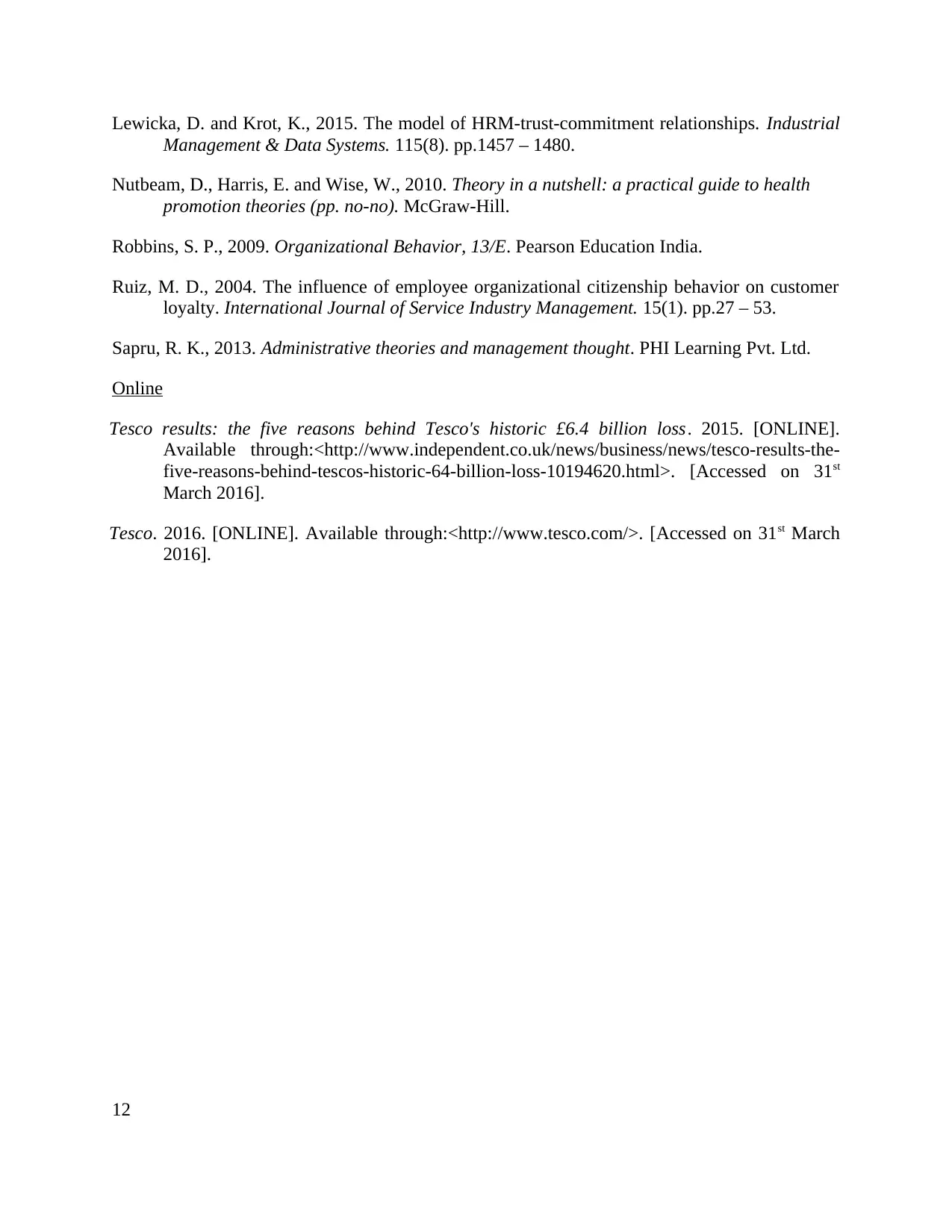
Lewicka, D. and Krot, K., 2015. The model of HRM-trust-commitment relationships. Industrial
Management & Data Systems. 115(8). pp.1457 – 1480.
Nutbeam, D., Harris, E. and Wise, W., 2010. Theory in a nutshell: a practical guide to health
promotion theories (pp. no-no). McGraw-Hill.
Robbins, S. P., 2009. Organizational Behavior, 13/E. Pearson Education India.
Ruiz, M. D., 2004. The influence of employee organizational citizenship behavior on customer
loyalty. International Journal of Service Industry Management. 15(1). pp.27 – 53.
Sapru, R. K., 2013. Administrative theories and management thought. PHI Learning Pvt. Ltd.
Online
Tesco results: the five reasons behind Tesco's historic £6.4 billion loss. 2015. [ONLINE].
Available through:<http://www.independent.co.uk/news/business/news/tesco-results-the-
five-reasons-behind-tescos-historic-64-billion-loss-10194620.html>. [Accessed on 31st
March 2016].
Tesco. 2016. [ONLINE]. Available through:<http://www.tesco.com/>. [Accessed on 31st March
2016].
12
Management & Data Systems. 115(8). pp.1457 – 1480.
Nutbeam, D., Harris, E. and Wise, W., 2010. Theory in a nutshell: a practical guide to health
promotion theories (pp. no-no). McGraw-Hill.
Robbins, S. P., 2009. Organizational Behavior, 13/E. Pearson Education India.
Ruiz, M. D., 2004. The influence of employee organizational citizenship behavior on customer
loyalty. International Journal of Service Industry Management. 15(1). pp.27 – 53.
Sapru, R. K., 2013. Administrative theories and management thought. PHI Learning Pvt. Ltd.
Online
Tesco results: the five reasons behind Tesco's historic £6.4 billion loss. 2015. [ONLINE].
Available through:<http://www.independent.co.uk/news/business/news/tesco-results-the-
five-reasons-behind-tescos-historic-64-billion-loss-10194620.html>. [Accessed on 31st
March 2016].
Tesco. 2016. [ONLINE]. Available through:<http://www.tesco.com/>. [Accessed on 31st March
2016].
12
⊘ This is a preview!⊘
Do you want full access?
Subscribe today to unlock all pages.

Trusted by 1+ million students worldwide
1 out of 12
Related Documents
Your All-in-One AI-Powered Toolkit for Academic Success.
+13062052269
info@desklib.com
Available 24*7 on WhatsApp / Email
![[object Object]](/_next/static/media/star-bottom.7253800d.svg)
Unlock your academic potential
Copyright © 2020–2026 A2Z Services. All Rights Reserved. Developed and managed by ZUCOL.




